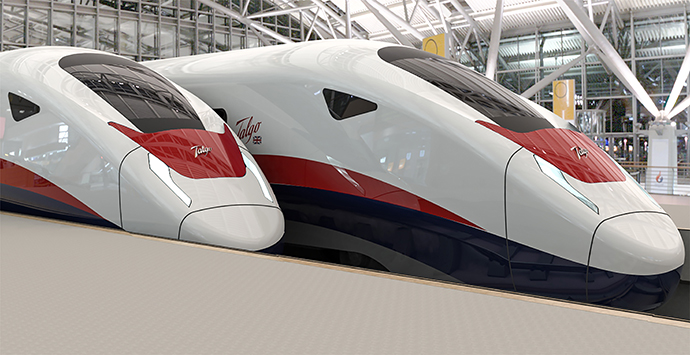At a defunct power plant site on Scotland’s Firth of Forth, not far from the aptly named Clackmannan, a family-owned Spanish company with global reach aims to hire 1,000 people to make railcars that will carry UK passenger rail from clickety-clack to the high-speed hum of a smart nation.
After a year-and-a-half of discovery and deliberation, Talgo on November 14 announced plans to invest in a new 70,000-sq.-m. (753,000-sq.-ft.) factory in Longannet. A second preferred site, the former Hartington Colliery in Chesterfield, Derbyshire, will serve as an Innovation Center, and be a focus from which an "All Britain" strategy will be developed. The central location will ensure wide accessibility, said the company.
The projects are initially focused on the UK market, but will be oriented toward export. However, it all comes with a giant asterisk: "Our strategy is to be ‘ready to build’ the day we receive an ‘anchor client’ — in other words, a train order," the company explained in an eight-page Q&A document that covered nearly every question a citizen, company leader, analyst or government official might have. "We’d hope that this will happen within 12 months, although, of course, that’s not our decision!"
Once that order is placed, the company projects it would take as long to build in Longannet as it did to choose the sites: 18 months. Talgo has been bidding to supply new trains to both HS2 (the UK’s new high-speed service based in Birmingham) and classic operators, and already has been shortlisted in the procurement process to supply Very High-Speed trains to be used in HS2 Phase One.

"I’ve never had this level of engagement before, the desire to support us and succeed and help in every element."
"This has been a tremendously challenging mission for Talgo, and I have personally seen excellence in all corners of the UK," said Carlos de Palacio, president of Talgo and grandson of the company’s founder). "It has been a difficult decision to make, as the quality has been so high in so many places. The establishment of a manufacturing facility at Longannet is a significant part of Talgo’s future strategy. I want to congratulate Paul Lewis and Scottish Enterprise for bringing together a wide-ranging team of industrialists, academics, politicians, civil servants and development experts. Their efforts are a credit to Scotland.
"However, our plans do not end in Scotland," he continued. "Linked to our ‘all Britain’ strategy, we intend to create opportunity and harness skills across the UK. Talgo’s aim is to establish true UK manufacturing – rather than assembling from parts made elsewhere. This will be a team effort, requiring the ‘Best of British." Our 18-month mission has revealed a determination and willingness across Britain to do just that."
The effort to link to the UK isn’t new. Though it has yet to site operations there, 35 percent of the company is owned by a UK-listed private equity fund working on behalf of UK pension funds.
Timely Confluence?
"A range of factors influenced the choice of preferred site," said Talgo’s press release. "These included excellent connectivity by sea, rail and road; the availability of skilled workers and the ability to create a ‘pipeline’ of engineers and innovators to grow capability; a tremendous ‘can do’ attitude on the part of all partners brought together by Scottish Enterprise; and a credible evidence-base to provide assurance that the facility could be ready on budget and on time." Elsewhere, the company stated, "The site at Longannet has great connectivity, would receive a major boost from job creation, and has the potential to supply people that can be skilled-up to meet the needs of building trains that can run at up to 235 mph."
With two main factories already operating at full capacity in Las Matas (Madrid) and Rivabellosa (Alava), Spain, Talgo (a Spanish acronym derived from "Goicoechea-Oriol light articulated train") employs over 2,000 people; has operations in Spain, Germany, Kazakhstan, Russia and the U.S.; and maintains an industrial presence in 28 countries. The company is the rolling stock provider for the Haramain high-speed railway line between La Mecca and Medina in the Middle East that just entered commercial service, and provider of the new AVRIL train to Spanish operator RENFE. Talgo says its trains have a unique undercarriage (called a ‘Rodal’) that can reduce wear and tear on the track. "They can operate faster over existing lines, are more efficient in build cost (up to 25 percent), and are more environmentally sympathetic," says the company.
Jon Veitch, Talgo’s UK & Ireland director, echoed his boss’s comments in describing the deep range of capabilities the company’s team uncovered during its search.
"When Talgo started this process, we were looking for just one site. However, we soon realized that all parts of the UK had something to offer," he said at the November announcement. "We have learned about the many rail-related initiatives across the UK, intended to boost capability for research, development, and testing. There is an engineering renaissance under way, and I want Talgo to be a leading partner."
The sentiment for such a renaissance has been growing for some years, led by the UK Department for Business, Energy & Industrial Strategy, and by champions such as Sir James Dyson of the eponymous Dyson company, which is expanding its range of products from vacuums and hand dryers to vehicles. The fact that Talgo is forgoing the usual sequence of establishing manufacturing first and R&D second by just doing both at once is a strong sign of a strategic commitment — however conditional it may be.
"As part of Talgo’s commitment to the UK-wide supply chain, our preferred second facility — in Chesterfield — will act as a catalyst," Veitch said in November, paying a compliment to "Team Chesterfield" Chief Executive Huw Bowen. "We are developing this aspect of our strategy, and continue to consult with potential partners … The team has proved that some of the most unexpected locations can win through, if they provide a compelling case and have inspirational leadership."
Man On the Scene
Earlier this week, I caught up with Veitch by phone in Edinburgh as he walked to catch a train to Inverness. Asked who made the train he was boarding, he says it was manufactured by British Rail, where he got his railway career started as an apprentice more than 30 years ago. Among his stops before joining Talgo in 2017 were stints with Hitachi, Pacific National Downer Australia, Directly Operated Railways, Arriva, and Scotrail. He’s also a bit of a transportation geek, as anyone who follows him on Twitter will discover.
In his work and travels, Vietch has seen a lot of the world — including the ultra-rapid expansion of rail in China — and sees the UK as a unique opportunity.
"This is a long-held desire to establish in the UK," he says of Talgo’s growth choice. The global market looks toward the UK with quite a bit of envy. The railway industry has never seen such opportunity for growth, with new trains, and the amount of people traveling. There’s a real opportunity to establish a facility, establish a supply chain and export to the rest of the world."
Even just the UK market justifies the gambit, says the company. In answer to its own question about whether the UK market is already saturated by too many competitors chasing too few contracts, Talgo’s response simply cites the facts: "The UK rail industry predicts a UK national fleet increase of between 40 percent (5,500 vehicles) and 85 percnt (12,000) vehicles forecast over the next 30 years."
"On the award of any contract, we’ll be ready on the next day to build," he says. "There are a number of opportunities in the UK and Ireland which are live, not just HS2, and which could be of significance. When combined together they give you the magnitude to make that full investment."
Veitch says a very detailed site selection process led by a corporate team of four supported by an independent consultancy resulted in the initial shortlisting of five locations, each of which received three personal visits. Locations near Leeds and Liverpool were in the mix at one point, according to press reports. Criteria included connectivity aspects such as road, shipping, rail and air networks, as well as availability of people with skills. A detailed questionnaire ranged across topics such as ecology of the land, costs and quality and curricula at schools and colleges.
"Everything was evaluated," he says. "Financial elements were not necessarily considered. Of course we were thinking about the effects of Brexit, but it’s such a long-term decision. If exporting, sourcing from within the UK doesn’t present any issues for us."
Even after such drawn-out due diligence, the final decision was "so close in the end," Veitch says. " We only decided the morning before the announcement — myself and the company president, with the rest of the senior team. Your decision has to be right, but it’s so powerful as well."
The Power of Places
Veitch is quick to point out the importance of Chesterfield, where there are not only a lot of engineers (the technical sort, not the drive-the-locomotive sort) and a number of government approval bodies. He also says a top engineering professor in the area will be a vital conduit to the Catapult program. Established by Innovate UK, the Catapult centers are designed to transform the UK’s capability for innovation in specific areas and help drive future economic growth, and have participated in more than 4,000 industry collaborations, as well as projects with SMEs.
Veitch says the company’s culture is all about innovation and global best practices, so Talgo personnel can expect to learn from the company’s other locations. They’ll also learn about the company’s singular attention to looking after people, Veitch says.
" I’ve been involved in closing facilities, and it’s not good," he says, "and you’re then chasing skilled bodies when there’s an upturn again." At Talgo, "even if there are workload reductions, we always maintain the same level of people. They hone their skills, and go onto the shop floor. That, for me, is a beautiful thing, and one of the key values of the company."
The power plant at Longannet — the last coal-fired plant in Scotland — closed in 2016. Asked about remediation at the site, Veitch says, "We were just today agreeing with Scottish Power about how far they go, because it obviously needs to be remediated and ready to go when we sign." Some of the final remaining structures will be demolished by 2021.

In addition to a nearby jetty that may be deployed for logistics in the future, near the Longannet site is the Rosyth Dockyard, where around 5,000 highly skilled workers with such firms as Babcock and BAE Systems are just finishing off their second aircraft carrier for the Royal Navy. Entering that talent pool in a historical mining area means the dual opportunity to both take advantage of elite digital and manufacturing skills already present while also introducing new skills to what was a very rich industrial environment, Veitch says. The site is also next door to a World Heritage site, giving Talgo the opportunity to build a structure that "isn’t just a box, but complements the area," he says. "That excites quite a few people, and there is potential engagement with some very significant architects."
Engagement is an overarching theme of this pending project, if Veitch’s experience is any measure. Even the unsuccessful locations, because they’ve been involved in the process, are still asking Veitch and his team how they can contribute and be part of Talgo’s success in the UK.
"It’s so powerful," he says, speaking of the company and the UK response at once. Even for someone whose father was a chief engineer for Canadian Pacific, went out to sea after completing his education and who’s carried his enthusiasm for rail and transport with him wherever he goes, "this is something completely different," he says. "It gets under your skin and makes you bounce out of bed every day. The doors that have opened for us and for me personally, you wouldn’t believe it. I’ve never had this level of engagement before, the desire to support us and succeed and help in every element."
That includes outreach from individuals.
"I was really touched," Veitch says. "Within minutes of the announcement, I had a personal email from a lady still serving in the military asking how she could apply to work for us. And every day I’m receiving applications from all walks of life, all abilities, and it’s not just from skilled people. It’s community people, headmistresses and headmasters of schools, asking how they can be part of this.
"Long term," he says, "the ability to build trains for the rest of the world is just massive. The HS2 is the only high-speed contract in the world available at the moment. That is going to be so iconic … but the UK — I’ve never seen anything like it before. It’s like the crown jewels have been given to us, with the levels of investment, and the ability to make changes."
The site selected, in effect, ends up being an entire nation.
"It was a Best of Britain, effectively," Veitch says. "It’s not just Longannet and Chesterfield, but the capabilities of people, colleges, apprenticeships. We will involve all parts of the country."

